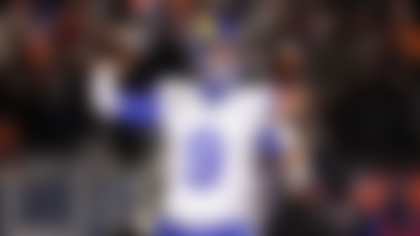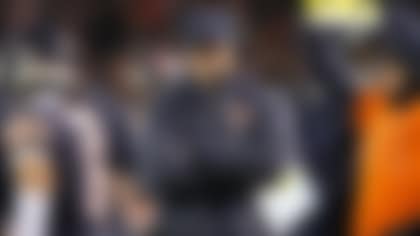Sean Payton has always been a stickler for details, so Tuesday morning he pulled up a search engine on his computer for tips on how to avoid crying during a speech.
Later in the afternoon, he sat before assembled media and confirmed he was stepping down as head coach of the New Orleans Saints after 15 NFL seasons. On those occasions when he felt his emotions splash against the rim of his dam walls, he reached for a bottle of water and squeezed the contents into his mouth, a trick he discovered on his Google search.
Payton had every reason to feel some kind of way. The bond he formed with the franchise and the community after being hired on Jan. 18, 2006, might never be seen again considering its uniqueness. He was a first-time head coach who took over a team that had only two winning seasons and one playoff appearance in the past 13 years and, more significantly, was dealing with the devastation of Hurricane Katrina, which reportedly killed at least 1,800 from the region.
There was talk of permanently moving the franchise from the city it has called home since 1967 because of damage to the stadium and city. Many were without power, clean water and a place to live, but everyone seemed to rally around the Saints and Payton, who along with general manager Mickey Loomis pieced together a team that, one year after finishing with the league's second-worst record, came within a game of reaching the Super Bowl. In fact, anyone who witnessed their return to the Superdome that season will never forget the emotion of the Steve Gleason blocked punt that contributed to their prime-time victory over the archrival Atlanta Falcons. The energy released following that play was cathartic, if not primal.
They would go on to win the franchise's only championship three years later thanks to the leadership of Payton, who helped to rebuild the fabric of the city with the on-field play of a quarterback with a reconstructed shoulder. Together, Payton and Drew Brees brought hope and joy to the region. They were central to the team posting 30 games with 500 or more yards of total offense since 2006, the most in the NFL in that span.
On Tuesday, Payton admitted he thought about walking away with Brees following the 2020 season, but kept his feelings to himself because he wasn't sure if his emotions were playing with him or he actually was ready to depart. But after a challenging 2021 season in which star receiver Michael Thomas never suited up because of injury, the team played on the road until October because of another hurricane, quarterback Jameis Winston tore an ACL in Week 8 and did not return, and Payton and a group of players missed a game because of COVID, causing the fourth-string quarterback to start one week -- after all of that, his gut, not his mind, confirmed it was time to move on.
"I don't know what's next," he said, "and it kind of feels good."
Television could be in his immediate future, as could long days and evenings on the beach. The only certainty, he said, is that coaching is not in his plans for 2022. Beyond that? Who knows.
His announcement Tuesday was shocking to some because of its suddenness, seemingly coming out of nowhere. But it wasn't necessarily surprising to those around him, including me.
I noticed a change in Payton in 2013 when he returned from serving a one-year league suspension -- as a result of the NFL's investigation into New Orleans' bounty program. He was more accessible, open and tolerant. I won't use the word reflective, because it goes a step too far. But there was something different. If his priorities weren't rearranged, the harshness of the boundaries he placed around them had definitely softened.
The Sean Payton who joined the Saints in 2006 was intense and often inflexible. He took names and let you know who was in charge. He suffered fools as well as he suffered losses.
But in recent years, he publicly handled disappointment and failure with decorum and finesse. Like after the officials failed to call pass interference on the Rams in the NFC Championship Game three seasons ago, preventing the Saints from advancing to the Super Bowl. It was an egregious non-call by the officials, one that would have sent Payton's temper through the Superdome roof in his younger days.
I waited in that postgame press conference for him to go off. I thought it might be one of those rants that live forever, or at the very least one that would go viral in today's social-media age. But it never came. Payton did express his displeasure, while biting his tongue so hard it should have drawn blood. But there was no soundbite to feed the sports news cycle.
Some will remember Payton for his 161-97 record, including the playoffs, and .631 winning percentage. For leading New Orleans to 10 winning seasons, nine playoff berths, seven NFC South titles, three NFC title games and one Super Bowl victory. In addition, I will remember his New Orleans tenure for bringing hope and pride to one of the league's best fan bases, for making New Orleans a destination for something other than Mardi Gras or the French Quarter.
As he met with reporters for one final time, he looked both comfortable and pained. He didn't have the visor on his head, whistle around his neck, or Saints shirt or pullover that seemed a daily staple. Instead he wore a collarless gray shirt, because, he said, his late mother once told him the color matched his eyes. Those eyes clouded during parts of his address, like when asked: Why now?
"I just felt like this season -- it was challenging for everyone -- but, man, I felt like it was time," he said. "I kind of knew heading into training camp, but you don't share that with anyone. You think, 'Let's see how the season goes.' And we're working hard and ..."
Payton paused and reached for a water bottle. He took a big gulp, then continued: "I felt the time was right for me. It's something I've been thinking about. You have close friends in the industry; I've lost a few close friends in this industry in the last two or three years. And forget football, there's a lot of other things (that are important). There's a lot of sacrifices you make. Not many get to choose their terms, and I looked at it as an opportunity to see my kids more, to travel more, to get in better shape. ... The attention to details are so important they can be exhausting, and so I felt as this season was winding down that it was the right thing. The last week and half I've gotten comfortable with that."
The only remaining question is for the Saints and how long it will take to build a statue of Payton outside the Caesars Superdome. He has earned one, not just for what he did for the team, but what he did for the city. Like any great coach, he left both in better shape than he found them.
Follow Jim Trotter on Twitter.












